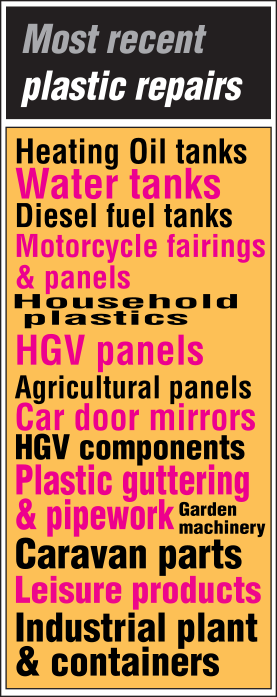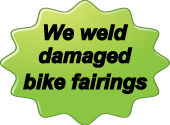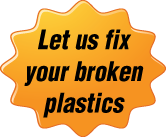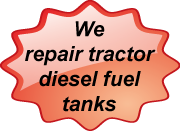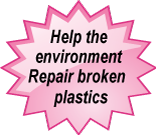When we are asked to repair a plastic item, the first task is to identify the plastic to establish if it can be welded. We need to have this information to see if a repair is possible.
Types of plasticsThere are basically two common types of plastics i.e. thermoplastics and thermosets. Thermoplastics will melt when heated but thermosets will not. Melting is essential for plastic welding so only thermoplastics can be welded.
The most common thermoplastics are PP (Polypropylene), HDPE (High density polyethylene), LDPE (Low density polyethylene), ABS (Acrylonitrile butadiene styrene) & (PVC (Polyvinyl chloride)Any plastics which operate at an elevated temperature (e.g. plastic parts on a car radiator or engine) are normally thermosets, because they wont melt or distort, so this type of plastic can't be welded.
However, some thermoplastic materials are cross-linked during the manufacturing process to add different properties and this makes them behave like a thermoset. This means they can't be repaired by plastic welding. Examples of cross-linked thermoplastic polyethylene products we see are some (not all) canoes, boats, kayaks and some plastic fuel tanks.
Identification of plasticsAll modern plastics should have an identifcation stamped into the plastic, usually on the reverse or underside.
There are usually two seperate indicators to identify plastics.
1. The first way to identify plastic is by locating three arrows forming a triangle with a specific number in the middle, the number ranges from 1 to 7 for the different plastic groups. This helps with recycling.
2. The other identifying system is more useful and uses letters contained within pointy brackets and these markings would probably be near to an item's part number. The most common plastics are PP (Polypropylene), HDPE (High density polyethylene), LDPE (Low density polyethylene), ABS (Acrylonitrile butadiene styrene) (PVC (Polyvinyl chloride) and these would be identified as <PP>, <HDPE>, <LDPE>, <ABS> & <PVC>.
High and low density cross-linked polyethylene will be marked as <XHDPE> or <XLDPE> or similar and these materials cannot be plastic welded.
Repairing plastic items is much more environmentally friendly than replacing them.
Contact us today to see how easy it is for us to fix the damage.
We repair broken, split and cracked plastics in the automotive, industrial, insurance, agricultural, construction, marine and domestic sectors.
Click on the link below to see examples of plastic welding repairs and fabrications we have carried out recently.
Click here to see our Recent Plastic Welding Repairs
